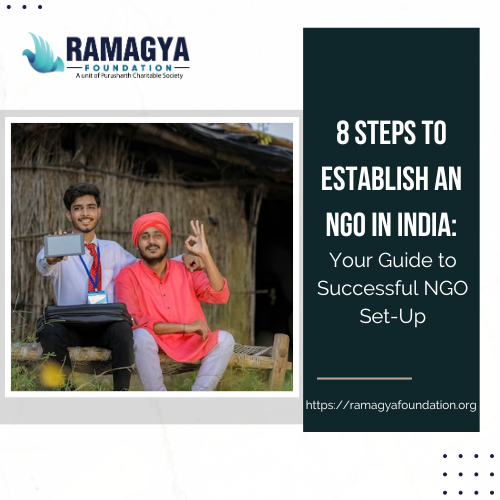Are you passionate about making a difference in society? Do you want to contribute to the betterment of your community? Setting up a Non-Governmental Organization (NGO) in India is a remarkable way to channel your passion and create a positive impact. Whether you aim to address issues related to education, healthcare, or any other cause, this blog will guide you through the eight essential steps for a successful NGO set-up in India.
8 Steps to Establish an NGO in India
- Define Your Mission and Objectives: Every NGO begins with a clear and noble mission. To start your journey, identify the social or environmental issue you are passionate about and determine your NGO’s objectives. The keyword ‘NGO Set Up’ begins here, as your mission is the foundation of your organization. Be specific, measurable, and realistic in setting your goals.
- Choose a Suitable Structure: In India, you can choose from various legal structures for your NGO, such as Trusts, Societies, or Section 8 Companies. The selection depends on your goals, scale, and nature of activities. Consult with legal experts or other established NGOs to make an informed decision. Ensure you use the keyword ‘NGO Set Up’ in your search for the proper structure.
- Register Your NGO: Once you select the appropriate structure, register your NGO with the relevant authorities. This process may vary by state, but it generally involves drafting a constitution, creating bylaws, and submitting the necessary documents to the Registrar of Societies or the Ministry of Corporate Affairs[1]. Remember to mention ‘NGO Set Up’ while navigating the registration process.
- Develop a Solid Team: Assembling a dedicated team is crucial for the success of your NGO. Seek out individuals who share your passion and are willing to contribute their skills and expertise. Building a solid team is integral to the long-term success of your NGO, especially in executing the ‘NGO Set Up’ effectively.
- Fundraising and Financial Management: Fundraising is an essential part of an NGO’s operation. Identify potential funding sources, such as grants, donations, or crowdfunding campaigns. Create a comprehensive financial plan to ensure proper allocation and management of funds. Good financial management is the backbone of a successful ‘NGO Set Up.’
- Legal Compliance: Running an NGO in India requires adhering to various legal regulations, including tax exemption, 80G and 12A registration, and compliance with the Foreign Contribution (Regulation) Act (FCRA). Maintaining meticulous records and submitting regular reports is essential to ensure your NGO operates smoothly and maintains its ‘NGO Set Up’ status.
- Develop Programs and Partnerships: Design programs and initiatives that align with your mission and objectives. Building partnerships with like-minded organizations, government bodies, and local communities can enhance the impact of your NGO. Collaboration is critical to a successful ‘NGO setup’ in India.
- Raise Awareness and Visibility: Your NGO needs to be visible and known to the public to make a difference. Develop a website, engage in social media marketing, and actively participate in events and campaigns related to your cause. Creating a strong online and offline presence is essential for promoting your ‘NGO Set Up.’
Conclusion
In conclusion, setting up an NGO in India is a fulfilling endeavor that can positively impact society. Use the keyword ‘NGO Set Up’ as your compass and follow these eight steps to create a successful and impactful organization. Remember, the journey of establishing an NGO is a continuous one, filled with challenges and rewards. Stay committed to your mission, and your NGO will thrive, leaving a lasting legacy of positive change.
